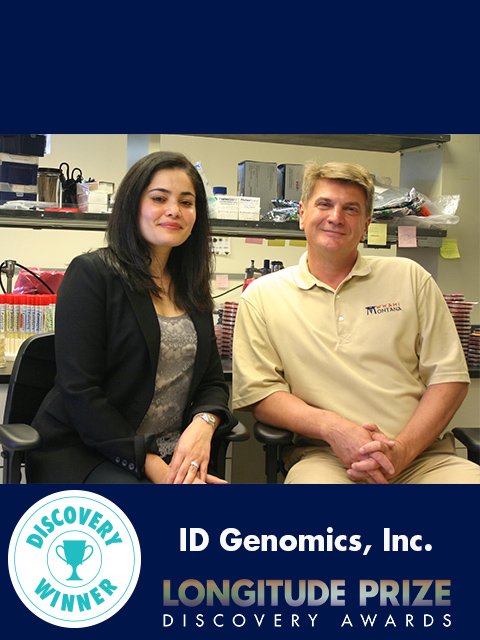This team successfully won a Discovery Award seed-funding grant to help further develop their ideas for their Longitude Prize application and create a diagnostic test that helps solve the problem of global antibiotic resistance. Below we have asked them to explain their test and motivation for applying.
Please explain your test.
When you go to a grocery store and buy something, the cashier scans the barcode on the box. The barcode scan keeps track of what you are buying and how much it costs. ID Genomics has developed barcodes that similarly identify bacteria. Using this technology will enable your care provider to quickly scan the bacteria for their unique barcode. The barcode will then give you a variety of information–where the bacteria came from, how sick they will make you, and which drug they should be treated with – in about ½ an hour. With our product, the doctor will no longer have to guess what you should be treated with–now they will be able to make these decisions based on evidence.
Please share a more detailed description of this work from a medical professional’s perspective.
Millions of disease-causing bacterial strains can be simplified into a few dozens of discrete, genetically homogeneous ‘crime families’ (clonal groups), each with distinct responses to antibiotics. Using only a handful of genetic targets, ID Genomics has developed a proprietary set of binary genomic barcodes to quickly identify these ‘crime families’ by using culture-independent barcoding technology or CLoNeTTM. These barcodes are linked to our reference metadata biorepository, BactNetTM, which connects them to responses to 22 commonly used antibiotics. BactNetTM is a constantly updated state-of-the-art epidemiological surveillance system developed through research collaborations with nine (and expanding) clinical laboratories across the U.S. and Europe. Using our diagnostic tools, clinicians will be able to stratify patient risk and determine which antibiotics, if any, should be used to treat the patient.
Why did you apply and what will the Discovery Award funding be used for in your work?
In its current format, CLoNeTTM is being developed as a singleplex PCR-based test. We applied to the Discovery Awards to adapt the current CLoNeTTM barcoding test from a singleplex assay to a multiplex lateral-flow assay. The output of this assay will be a 1-D barcode that can easily be read by an optical barcode reader. This output feeds back to our central database that links barcodes to antibiotic responses.
What difference will your work make in the long term with regards to antimicrobial diagnostics?
Poor public health indicators, rising incomes, and easily available inexpensive antibiotics are creating the ideal conditions for a large-scale selection and dissemination of resistance genes worldwide. While diagnostics are not easily available in most countries, antibiotics are. Patients consume antibiotics largely due to uncertainty regarding a bacterial infection, or its likelihood to progress to a more serious infection. Large-scale antibiotic overuse is now accompanied by devastating statistics regarding antimicrobial resistance.
Our technology has the potential to improve healthcare outcomes and save lives by matching the infecting bug with the right drug the FIRST time a patient comes to a clinic. Our diagnostic tools are expected to reduce ineffective antibiotic prescriptions, improve prescription practices, and champion antibiotic stewardship. Our technology also has the ability to pinpoint resistance outbreaks, and curb the dissemination of resistant strains through the global healthcare community.
Who is on your team?
Dr. Kaveri Parker (President and CEO)
Dr. Evgeni Sokurenko (Founder and Chairperson)
Dr. Mansour Samadpour (Member of the Board)
Dr. Elena Rechkina (Director of Laboratory Operations)
Ms. Sandy Ryan (Director of Finance)
If you are interested in collaborating with this team, please email us.

